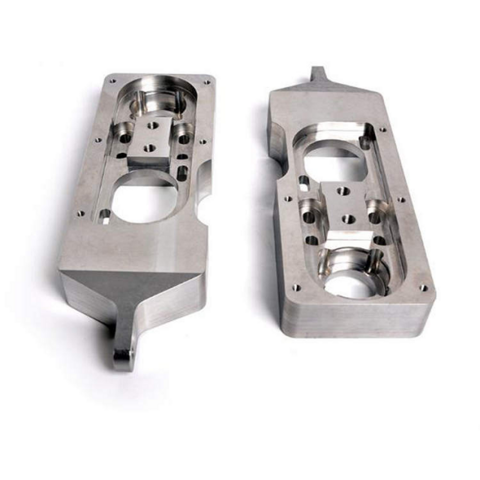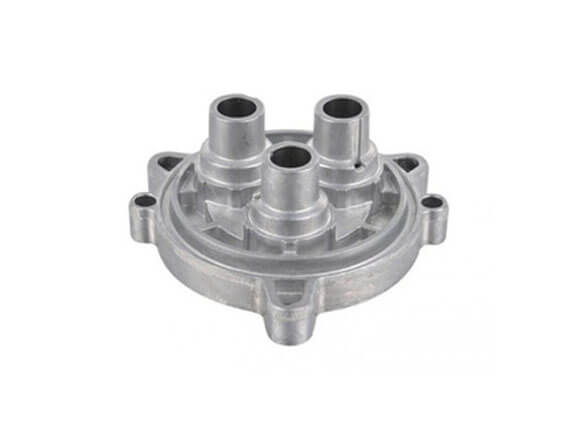How Light Weight Aluminum Spreading Adds To Reliable Manufacturing Solutions
Aluminum casting plays an essential role in modern-day manufacturing. Its lightweight nature and corrosion resistance make it a preferred selection for various markets. Techniques such as die casting and sand casting permit for the production of complex components with very little waste. The combination of automation further improves manufacturing performance. Nonetheless, the ramifications of these developments prolong beyond plain efficiency. Recognizing the broader impact discloses considerable understandings into the future of manufacturing
The Advantages of Light Weight Aluminum in Manufacturing
Numerous steels are made use of in manufacturing, light weight aluminum stands out due to its special properties that boost manufacturing effectiveness and item efficiency. Its lightweight nature especially decreases transport costs and energy needs in different applications. Light weight aluminum's exceptional rust resistance warranties durability and longevity, lessening the requirement for regular substitutes and upkeep. This steel can be easily molded and formed, permitting for functional design alternatives that satisfy certain market demands. Additionally, aluminum displays premium thermal and electric conductivity, making it an optimal option for applications calling for effective heat dissipation and electrical administration. The recyclability of light weight aluminum also plays an important duty in sustainable production techniques, as it can be recycled without losing its fundamental homes. In general, the benefits of light weight aluminum in producing lead to cost savings, enhanced item durability, and a reduced ecological footprint, making it a recommended material in numerous markets.
Secret Aluminum Spreading Techniques
Light weight aluminum spreading techniques are vital for producing top notch components in numerous producing procedures. The primary methods consist of sand casting, pass away casting, and financial investment casting. Sand spreading includes producing a mold from sand, which enables huge elements and complex forms. This technique is commonly favored for its cost-effectiveness and adaptability. Pass away casting, on the other hand, uses high-pressure to inject liquified light weight aluminum right into steel molds, resulting in specific, consistent components suitable for high-volume manufacturing. Investment spreading provides remarkable surface coating and detailed detail by making use of a wax pattern that is dissolved to develop the mold and mildew. Each of these techniques has certain applications and benefits, enabling suppliers to choose one of the most ideal technique based on variables like production quantity, product, and complexity specifications. By comprehending these crucial methods, makers can enhance their production efficiency and guarantee the stability of their aluminum components.
Influence On Automotive Market
As the automotive industry significantly focuses on lightweight products to improve fuel effectiveness and efficiency, light weight aluminum spreading has become a crucial solution. This manufacturing process enables car manufacturers to produce complicated components with decreased weight without jeopardizing structural integrity. By utilizing aluminum casting, manufacturers can produce components such as engine blocks, transmission real estates, and suspension parts that are not just lighter yet also exhibit superb thermal conductivity and deterioration resistance.
The flexibility of aluminum spreading techniques enables the manufacturing of complex styles, helping with development in lorry looks and functionality. As lorries end up being extra technically advanced, the capability to incorporate functions like sophisticated safety and security systems and electrical drivetrains ends up being vital.

Aerospace Applications of Light Weight Aluminum Casting
Light weight aluminum spreading plays a critical role in aerospace applications by enabling the manufacturing of light-weight structural elements that improve gas efficiency. Furthermore, the precision of light weight aluminum spreading enables the creation of intricate engine components, which are essential for peak efficiency and integrity. This mix of lightweight products and accurate engineering placements light weight aluminum spreading as a crucial modern technology in the aerospace industry.
Light-weight Architectural Elements
In the mission for enhanced performance and efficiency in aerospace applications, light-weight architectural components have ended up being progressively crucial. Light weight aluminum spreading plays a critical function in this venture, providing manufacturers with the capability to create components that are both solid and lightweight. The reduced thickness of light weight aluminum enables substantial weight reductions without compromising structural integrity, which is vital for aircraft efficiency and gas efficiency. Additionally, aluminum spreadings can be crafted to fulfill particular layout demands, allowing the production of complex geometries that typical manufacturing techniques might have a hard time to accomplish. This flexibility not only streamlines manufacturing procedures yet additionally adds to total cost savings. As the aerospace market remains to stress sustainability, the demand for light-weight light weight aluminum parts is anticipated to rise, even more advancing development in production.
Accuracy Engine Components
Makers increasingly count on light weight aluminum spreading to produce accuracy engine parts for aerospace applications, driven by the material's one-of-a-kind properties. more info Aluminum's light-weight nature substantially reduces overall airplane weight, boosting fuel performance and performance. Its superb corrosion resistance guarantees long life in harsh atmospheres, making it ideal for essential engine parts. Additionally, light weight aluminum spreading allows for limited resistances and detailed designs, essential for maximizing engine performance and integrity. The casting procedure additionally sustains mass production, making it possible for suppliers to meet high need while keeping high quality criteria. As aerospace modern technology remains to advance, the function of aluminum spreading in developing precision engine parts will certainly be essential in achieving higher performance and development in airplane design and performance.
Sustainability and Ecological Benefits
The growing emphasis on sustainability in manufacturing has actually placed aluminum casting as a leading option for ecologically aware production. This procedure uses recycled aluminum, which significantly minimizes energy usage contrasted to primary aluminum production. By leveraging scrap steel, manufacturers can lower their carbon footprint and lessen waste, straightening with worldwide sustainability objectives.
In addition, aluminum spreading generates less unsafe discharges, adding to a cleaner atmosphere. The lightweight nature of light weight aluminum additionally enhances fuel effectiveness in transportation applications, further advertising environment-friendly methods.
The durability and corrosion resistance of light weight aluminum lead to longer product life expectancies, minimizing the demand for frequent replacements and conserving resources. As markets significantly focus on lasting choices, light weight aluminum casting sticks out as an ingenious technique that not just meets manufacturing needs but additionally sustains environmental stewardship. This dedication to sustainability settings light weight aluminum spreading as an essential gamer in the change in the direction of a greener production landscape.
Price Efficiency in Production
Expense effectiveness is a significant advantage of aluminum casting, complementing its sustainability advantages - aluminum casting. The process of light weight aluminum spreading enables the production of complicated forms with very little waste, which is specifically crucial in an affordable manufacturing setting. Making use of aluminum reduces energy expenses, as it has a reduced melting point contrasted to other steels, bring about decreased power consumption during production
Furthermore, light weight aluminum's lightweight buildings add to reduce delivery and handling expenses, additionally enhancing general expense efficiency. The durability and corrosion resistance of aluminum actors items likewise imply that they need much less upkeep and substitute over time, resulting in long-term cost savings for producers.
In addition, advancements in casting technologies, such as boosted mold and mildew designs and automation, have streamlined production procedures, minimizing labor costs and raising result efficiency. In general, cost performance in aluminum casting plays a vital duty in enhancing production procedures and supporting affordable prices approaches.
Future Patterns in Aluminum Casting
The future of light weight aluminum casting is significantly shaped by innovations in automation and lasting product advancements. Automation innovations are expected to improve effectiveness and accuracy in the casting process, while sustainable methods intend to reduce ecological effect. With each other, these fads promise to redefine manufacturing requirements and methods within the light weight aluminum casting industry.
Automation in Light Weight Aluminum Casting
Accepting automation is changing aluminum casting procedures, leading the way for improved effectiveness and precision. Automated systems enhance production by decreasing human treatment, minimizing mistakes, and enhancing throughput. Technologies such as robot arms and computer numerical control (CNC) devices enable consistent and accurate shaping of light weight aluminum parts. Additionally, wise sensors keep an eye on numerous parameters in actual time, ensuring excellent conditions throughout the casting process. This integration of automation not just shortens lead times but also boosts item top quality by keeping tighter tolerances. As producers progressively take on these advanced innovations, the light weight aluminum spreading sector is established to experience considerable renovations in functional efficiency, cost-effectiveness, and competitiveness in the international market.
Lasting Product Innovations

Regularly Asked Concerns
What Kinds Of Aluminum Alloys Are Generally Utilized in Casting?
Frequently made use of aluminum alloys in casting include 356, 380, and 413. These alloys are preferred for their superb fluidness, strength, and rust resistance, making them ideal for a selection of industrial applications.
Just How Does Light Weight Aluminum Casting Contrast to Various Other Steel Spreading Techniques?
Light weight aluminum casting normally supplies lower weight, superior rust resistance, and far better thermal conductivity contrasted to various other metal casting techniques. In addition, it permits complex layouts and faster production cycles, improving overall manufacturing performance and efficiency.
What Industries Advantage Most From Light Weight Aluminum Casting?
The vehicle, aerospace, and electronics industries profit most from aluminum spreading. These industries utilize its light-weight, corrosion-resistant residential or commercial properties to enhance efficiency, minimize gas consumption, and enhance general product effectiveness, making aluminum casting significantly crucial.
Are There Certain Style Limitations With Light Weight Aluminum Spreading?
Yes, light weight aluminum spreading has layout limitations, including limitations on wall surface thickness, complex geometry obstacles, and prospective problems with accomplishing tight resistances (Aluminum Casting Company). These aspects can impact the total toughness and functionality of the end product
Exactly How Is Quality Assurance Maintained in Light Weight Aluminum Spreading Processes?
Quality control in aluminum casting processes is kept with strenuous inspections, adherence to standard procedures, and using advanced technologies. Regular tracking guarantees dimensional precision, surface stability, and product consistency throughout production, advertising general reliability.
As the vehicle industry increasingly focuses on lightweight materials to improve gas efficiency and performance, light weight aluminum spreading has arised as a crucial solution. Light weight aluminum casting plays a critical duty in aerospace applications by allowing the production of light-weight structural components that improve fuel efficiency. Expense effectiveness is a significant advantage of aluminum casting, matching its sustainability advantages. Welcoming automation is transforming light weight aluminum spreading processes, leading the method for boosted effectiveness and accuracy. Recycled aluminum usage has gained grip, significantly decreasing energy consumption contrasted to primary light weight aluminum manufacturing.